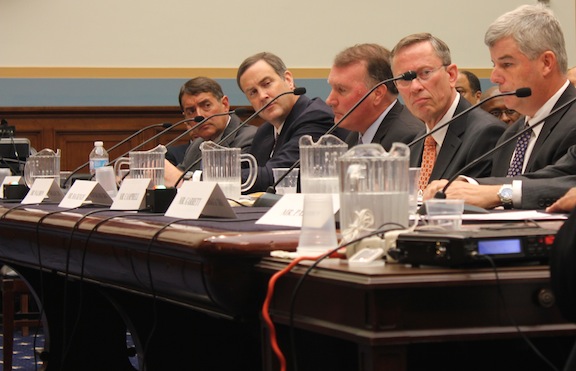
WASHINGTON – Satellite television providers, including DISH Network, and content providers, including Major League Baseball, may have to play “Let’s Make a Deal” come the beginning of 2015.
Now, television content providers have the ability to transmit shows, sporting events and other content, to far-away audiences – so D.C. basketball fans can watch the Los Angeles Lakers from their homes all the time.
There are far fewer long-distance satellite providers than there are local program providers – meaning organizations such as Major League Baseball and the National Football League have few outlets to negotiate broadcast rights with.
Ultimately, if a deal isn’t struck before the end of next year between the satellite providers and the television show organizations, about 2 percent of consumers who use the long-distance satellite signals might have less programming variety – and could end up paying more.
This disagreement took center stage last week at hearing before the House Judiciary Committee, which is reviewing Section 119 of the 1988 Satellite Home Viewer Act. That section allows satellite companies to retransmit signals of distant TV stations and superstations to their customers.
The Library of Congress’ Copyright Royalty Board sets the royalty rates for television stations and satellite providers.
But things have changed since 1988, when most satellite TV customers lived in rural areas far from TV stations. Now, satellite dishes are ubiquitous, and program providers say it’s time to stop the practice to protect their copyrighted programming.
Roger E. Schechter, a professor of law at George Washington University, said in an interview that each side of the debate has a case to make about whether the current statute will continue.
“The incentive that the satellite companies have is that they need content,” Schechter said. “Their subscribers are paying for content.”
He said that without an agreement programming provided by television networks such as ABC, NBC or ESPN, would reach fewer people, including cable subscribers as well as those with satellite TV. Program providers would attract smaller audiences and would have to lower their advertising rates.
“The consequence of all of this is that if the statute were to lapse, they would have to do a deal with individual companies, and some could say no,” he said. “There would be a gap or a hole in a program lineup that they could offer their customers.”
TV stations and networks – including Fox, ESPN and TBS – broadcast 5,000 Major League Baseball nationally each year.
Testifying on behalf of MLB, Arnold and Porter lawyer Robert Alan Garrett said baseball relies on copyright laws to protect its programming.
“If the compulsory licenses are retained, baseball urges Congress to ensure both cable operators and satellite carriers pay fair market value for all programming they choose to carry pursuant to the compulsory licenses,” Garrett said.
On behalf of the National Association of Broadcasters, Gerard J. Waldron testified for the dissolution of the statute, saying the updates in technology make the law obsolete.
“In 2013, the distant signal license is a vestige of a bygone era, a time before fiber optics, compression technology, digitization and the ability they have brought to provide local stations to nearly all subscribers,” the Covington and Burling law firm partner said.
He said the last time the act was reauthorized in 2010, only 2 percent of households continued to acquire a distant signal package.
Dennis Wharton, executive vice president of media relations for the National Association of Broadcasters, said 2 percent equates to about 1 million to 1.5 million people, a number the satellite companies provided to the NAB.
“We think it’s inflated,” Wharton said. “We think it’s likely that the numbers are less than that.”
CenturyLink’s Regional Vice President for Public Policy James Campbell said in the event of broken-down negotiation processes, the company should be allowed to provide national programming from an alternative market.
“Consumers should not be punished as a result of provider negotiations,” Campbell said.
CenturyLink is the third-largest telecommunications company in the U.S. serving more than 14 million homes, federal and state government agencies and businesses in every state and in international markets.
With advances in video-streaming technology and content providers such as Hulu and Netflix streaming directly to consumers, Schechter said this issue may be a moot point in the not-so-distant future.
“The compulsory licenses for cable and satellite were originally designed to help, at the time, new or infant industries,” he said. “The logic of it was smaller satellite TV needs the government to set the price because the content providers would put them out of business before they could stand on their own.”
Netflix has nearly 30 million subscribers in the U.S. and more than 7 million subscribers internationally, while Hulu Plus has just over 4 million subscribers.
Reach Sean Bradley at [email protected] or 202-326-9866.




